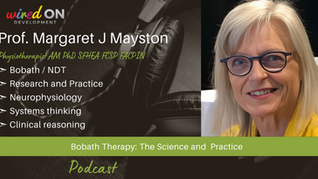Jean-Pierre Maes: A blueprint for excellence in neuromotor rehabilitation
- Apr 18, 2021
- 2 min read
Updated: Apr 6, 2022

Director, MAES Therapy International Consultant Neuro-developmental Physiotherapist Halliwick Senior Lecturer
If you've ever wished for a blueprint that would guide you through the process of becoming an exceptional clinician, then you want to sit down with me for a chat with Jean-Pierre Maes. Jean-Pierre has packaged his years of learning, his experience, and unmatched clinical reasoning and analysis skills into the MAES therapy approach. This approach gives therapists the skills to understand the clinical picture as an expression of brain function; and the tools to target brain function rather than body function. If you are working with kids with brain-based movement disorders, you can't afford to miss this interview!
Enjoy!
For handy links to things we've discussed in this interview, scroll down to the Resources Section at the bottom of the page.
Listen, enjoy, share...
Podcast Highlights
Time Stamps in green
13:12 minutes- Searching for the active ingredients in approaches
18:39 minutes- Developing M.A.E.S. therapy
22:35 minutes- A new perspective in neuromotor rehabilitation
26:12 minutes- Why current ways of classifying children are too simplistic to guide therapists
29:26 minutes- How to understand brain function and dysfunction from a clinical perspective (if you listen to nothing else, listen to this 🤯😃)
31:29 minutes- A Fabulous Army Analogy
33:06 minutes-Reaching plateaus in therapy - why and what to do about them
37:16 minutes- What's your brain for?
40:19 minutes- You need to create an opportunity for the brain to want to change
41:16 minutes- Application example - white matter lesion vs cerebellum
46:16 minutes- Non-progressive does not mean non-evolving
47:42 minutes- For an atypical brain, typical development is irrelevant - so now what?
49:44 minutes- Differentiating between Bobath and MAES
52:42 minutes- EBP and the M.A.E.S. approach
1:01:32 minutes- Advice for new therapists
1:05:30 minutes-More about M.A.E.S. course

M.A.E.S. Therapy e-Poster presented at the 32nd European Academy of Childhood Disability Annual Meeting (2020) -->>

Right in the Middle: Selective Trunk Activity in the Treatment of Adult Hemiplegia - by Patricia M. Davies
The Man Who Took His Wife for a Hat - by Oliver Sacks Hat
Please note - book links are Amazon Affiliate links. If you decide to use them, I appreciate your support!






















Comments